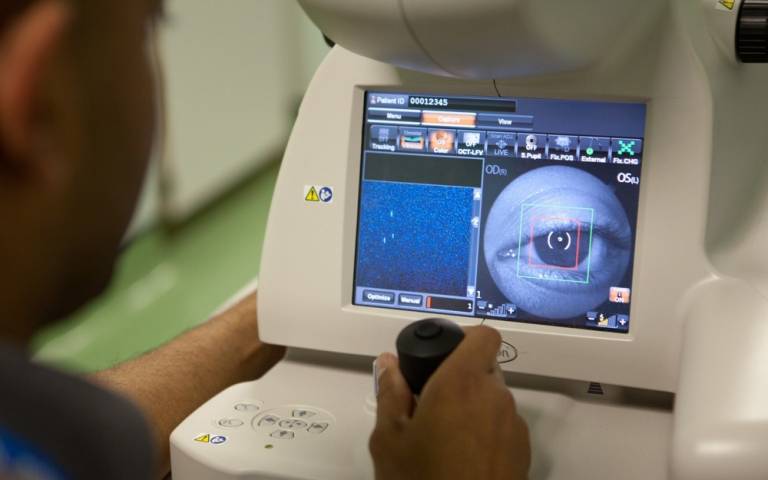UCL plays significant role in pioneering data research centres
24 September 2019
UCL is a key partner in four of seven new centres announced by Health Data Research UK.

The data hubs, to be set up across the UK from October this year, will speed up research for new medicines, treatments and health technologies to support quicker diagnosis and save lives. They will promote better use of health data by linking up different types of data and making it more easily accessible and user-friendly for research, while maintaining strict controls around data privacy and consent.
UCL is a partner in:
DATA-CAN – The Health Data Research UK Hub for Cancer, hosted by UCLPartners to transform how cancer data from across the UK is used to improve patient care. By working with patients across the UK to bring their clinical data together, the hub will lead on using data to help develop improved cancer treatments, give patients faster access to clinical trials and understand how to improve NHS cancer services.
With one in two people predicted to get cancer during their lifetime, the team believes that using cancer data more effectively could improve survival rates and contribute to saving 30,000 lives each year.
DATA-CAN’s founding partners are UCLPartners, Queen’s University Belfast, University of Leeds and Leeds Teaching Hospitals, Genomics England and IQVIA.
INSIGHT – The Health Data Research UK Hub for Eye Health, focused on eye disease and its application to wider health, including diabetes and dementia. The hub will use anonymised large-scale data and advanced analytics, including artificial intelligence, to develop new insights into disease detection, diagnosis, treatment and personalised healthcare. It will focus particularly on accelerating the pace at which AI is able to translate to real patient benefit and accelerate innovation.
INSIGHT is founded by University Hospitals Birmingham NHS Foundation Trust, Moorfields Eye Hospital NHS Foundation Trust (part of UCLPartners), University of Birmingham, Roche, Google Health and Action Against AMD.
BREATHE – The Health Data Research Hub for Respiratory Health, which aims to improve the lives of people with respiratory conditions such as asthma and chronic obstructive pulmonary disease through better use of data in research and clinical practice.
The UK is home to the richest datasets in the world relating to respiratory health, but the data is fragmented, inconsistently structured and difficult to access, limiting its usefulness for research. Designed in partnership with patients, BREATHE will make it easier for experts to use data in safe and secure ways by creating FAIR datasets – Findable, Accessible, Interoperable and Reusable.
Discover-NOW – The Health Data Research Hub for Real World Evidence, which is bringing together NHS organisations, academic, technology, industry and charity partners, patients and the public to revolutionise how health information is used to treat and prevent disease in the future.
Health research has predominantly used data to look retrospectively. Discover-NOW aims to change that by providing clinicians and researchers with de-identified linked patient information in near to real time. This timely data will enable new patterns in deases to be spotted, helping to better manage many conditions and, in some cases, prevent them from happening in the first place.
Welcoming the new data research centres, Professor David Lomas, Vice-Provost (Health) at UCL, said: “Data is the fuel that drives health research and being able to access and link health-related data in this way will significantly improve the scale and speed at which we can develop treatments, identify risks and understand the causes of disease. I’m delighted that UCL is part of four of the seven hubs announced today and is working with partners across the UK to focus our expertise on making a real difference to patient outcomes and experience.”
Professor Alan Thompson, Dean of UCL’s Faculty of Brain Sciences and Pro-Vice-Provost (London), added: “I’m extremely proud that UCL’s collegiate and collaborative approach means we are part of four out of seven of these innovative new data centres. We are far more effective and successful when we work across London and when London links to the other parts of the UK, and I am delighted that we are combining our expertise, knowledge and resources in this way to make real improvements to health and well-being.”
The new data research hubs form part of a four-year £37m investment from the UK Government’s Industrial Strategy Challenge Fund to create a UK-wide system for the safe and responsible use of health-related data on a large scale.
Links
- UCLPartners
- UCL Cancer Institute
- UCL Ophthalmology
- UCL Medical Sciences
- UCL Brain Sciences
- Office of the Vice-Provost (Health)
- Health Data Research UK
- Government’s Industrial Strategy Challenge Fund
Source
Image
An OCT (optical coherence tomography) machine in use by a technician performing a scan in order to detect disease. (Credit: Moorfields Eye Hospital.) The Health Data Research UK Hub for Eye Health will use anonymised large-scale data and advanced analytics, including artificial intelligence, to develop new insights into disease detection and diagnosis.
 Close
Close

